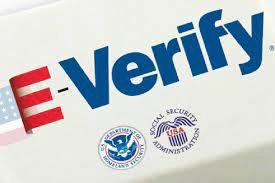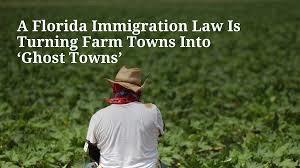 With the apparent failure of the Immigration Bill previously agreed to in principle by both chambers of Congress, the U.S. will continue to function with legislation passed in 1990. Although agricultural workers can enter the U.S. on H-2A visas, there is a general agreement among many sectors of agriculture including dairy, produce and fruit that the allocation is inadequate. Foreign workers can be legally employed providing they comply with E-Verify requirements. There is evidence that the system of verification is being gamed with both deceptive documentation and widespread overlooking of the requirement.
With the apparent failure of the Immigration Bill previously agreed to in principle by both chambers of Congress, the U.S. will continue to function with legislation passed in 1990. Although agricultural workers can enter the U.S. on H-2A visas, there is a general agreement among many sectors of agriculture including dairy, produce and fruit that the allocation is inadequate. Foreign workers can be legally employed providing they comply with E-Verify requirements. There is evidence that the system of verification is being gamed with both deceptive documentation and widespread overlooking of the requirement.
It has become politically expedient for some state administrations to pass legislation enforcing E-Verify. Florida enacted SB1718 that impacts approximately 750,000 undocumented immigrants working in the state, mainly in agriculture but also construction and tourism. What initially appeared to be a popular but discriminatory law has now emerged as a restrictive measure notwithstanding the reliance of Florida and other states on foreign labor. Both farming and business communities are experiencing difficulty in recruiting and retaining workers many of whom are undocumented. The law mandating E-Verify resulted in an exodus of workers from the state fearing deportation. SB1718 also serves as a license to exploit through wage theft, harassment and substandard accommodation given that workers are captive under illegal employment and have no legal recourse.

Attempts to enforce E-Verify in Florida resulted in protests from agricultural associations and the state Chamber of Commerce with a movement to have SB1718 rescinded given the negative economic impact. Some states including North Carolina have enacted loopholes exempting agriculture and specified industries from nominal compliance with E-Verify. Studies on the effect of enforcing E-Verify suggest profound economic loss as in Georgia in 2011 when undocumented workers left the state, resulting in a decline in agricultural revenue exceeding $100 million.
Politicians endorsing E-Verify point to the need to preserve jobs for U.S. citizens. If there were sufficient applicants from our under- and unemployed residents for available but relatively low-paid agricultural and construction positions in Florida, California and the Carolinas, there would not be a demand for foreign workers. It is questioned why the U.S. expends public funds on SNAP and unemployment benefits when jobs are available.
 It is clear that the current look-the-other way approach to E-Verify favors agriculture, construction and tourism. There is a ready supply of both illegal and documented workers willing to labor for statutory minimum or sub-minimum wages. If foreign workers were not available, wage rates would rise possibly attracting unemployed U.S. workers. At some point, there will have to be a balance between legal entry with work offered at minimum wage rates coupled with employment of U.S. citizens.
It is clear that the current look-the-other way approach to E-Verify favors agriculture, construction and tourism. There is a ready supply of both illegal and documented workers willing to labor for statutory minimum or sub-minimum wages. If foreign workers were not available, wage rates would rise possibly attracting unemployed U.S. workers. At some point, there will have to be a balance between legal entry with work offered at minimum wage rates coupled with employment of U.S. citizens.
E-Verify currently is subject to inaccuracies that place eligible workers at a disadvantage and allows fraudulent credentials. Perhaps if the E-Verify system were to be modified, to become reliable and accurate and if it would become the law of the land, with an adequate supply of H-2A visas, the labor situation might be improved.
Inclusion of a pathway to permanent residency and eventually citizenship, as offered by Canada, was a major objection to the proposed Immigration Bill that has been under review since 2019. An E-Verify federal mandate should be included in a comprehensive immigration bill but with adequate availability of H-2A visas. Farmers and companies that rely on and benefit from foreign labor would be more productive and profitable. A just and equitable immigration bill specifying the rights and obligations of foreign workers and employers would benefit the economy and all concerned.